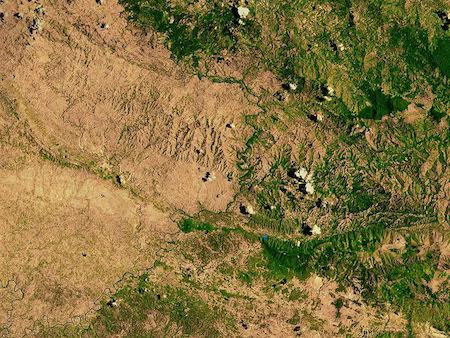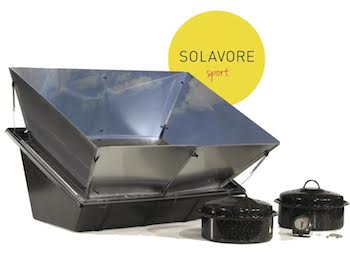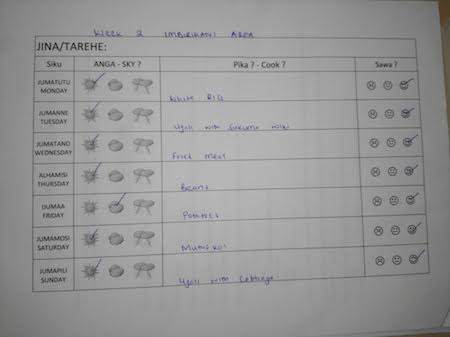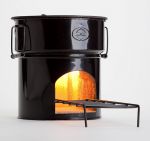Creating ‘Solavores’ By Thinking Inside the Box
If your diet includes meat you’re a carnivore. Herbivores consume plants only. Both? You’re an omnivore. But if you’re a solavore that must mean that you eat “of the sun.”
Creating solavores the world over – that’s my goal, as CEO of Solavore LLC, the manufacturer of the Solavore Sport solar oven. As a St. Paul, MN headquartered social enterprise, the company’s mission is to enlighten families in the developed world (who arguably have every means under the sun to cook their meals) to the fun and magic of solar cooking. We then use profits to subsidize this clean-cooking technology for the 2.7 billion people in the developing world for whom wood fire is the only cooking option, with the inevitable result: lung damage (over 4 million deaths per year of respiratory illness in women cooking over open fire, often indoors, including the infants on their backs and the toddlers at their sides).
 An equally dire casualty: the world’s forests. Haiti, now 98 percent deforested, is the poster child country of denuded landscape – an image indelibly burned in the memory of anyone who has ever flown over Dominica and looked down on the harsh contrast between the jungles of the Dominican Republic juxtaposed against the moonscape that is Haiti (left).
An equally dire casualty: the world’s forests. Haiti, now 98 percent deforested, is the poster child country of denuded landscape – an image indelibly burned in the memory of anyone who has ever flown over Dominica and looked down on the harsh contrast between the jungles of the Dominican Republic juxtaposed against the moonscape that is Haiti (left).
On the other side of the world, Cambodia’s primary rainforest cover fell dramatically from over 70 percent in 1970 at the end of the Vietnam War to just 3.1 percent in 2007.
Turning to Africa, charcoal burning has been named the biggest threat to Kenyan forests, where less than 2 of the country’s forests still stand. A daunting challenge, for which Solavore has joined forces with the UN Foundation’s Global Alliance for Clean Cookstoves, calls for 100 million households to gain access to clean and efficient cookstoves and fuels by 2020.
Solar kitchen basics
Solar cookers come in three basic varieties – parabolic, panel and box-type cookers – with analogies in the Western kitchen. Parabolic solar cookers are the stovetop, with a high-temperature surface (a grill or a teapot) suspended in the center of a dish-shaped reflector, typically reaching temperatures of 400 degrees Fahrenheit and higher. Panel and box type cookers, on the other hand, are the solar kitchen’s oven equivalent, and in the case of the Solavore Sport, the oven and the slow-cooker, depending on whether the optional, detachable reflectors are in use. Typically cooking in the 225-300 degree range, Solavore Sport users bake, slow-cook and even dehydrate foods in their solar ovens.
Not your father’s razor
 Solavore was launched in January 2015, when my partners and I breathed new life into the solar oven business initially operated as the nonprofit Solar Oven Society, which introduced the Sport solar oven more than 15 years ago. The brainchild of solar engineers from 3M Corporation and the University of Arizona, in the ensuing years more than 20,000 Sport solar ovens were deployed in over 60 countries, including to Puerto Rico, where I first acquired mine in 2009.
Solavore was launched in January 2015, when my partners and I breathed new life into the solar oven business initially operated as the nonprofit Solar Oven Society, which introduced the Sport solar oven more than 15 years ago. The brainchild of solar engineers from 3M Corporation and the University of Arizona, in the ensuing years more than 20,000 Sport solar ovens were deployed in over 60 countries, including to Puerto Rico, where I first acquired mine in 2009.
Rapidly evolving from curious user to devotee to evangelist, I was distraught at hearing the news in 2012 that the Solar Oven Society had halted production, depriving the world of this simple, effective cooking solution that uses only the power of the sun to reliably feed families for decades at a cost of only pennies per meal. (I’m a bit like Victor Kiam – the president of electric shaver company Remington; I liked the product so much I bought the company).
My 25-year career in high tech, including a four-year stint running sales and operations planning for Steve Jobs at NeXT Computer, seems an unlikely precedent for heading up a solar oven company. Even in the fast pace of high tech, however, I managed to find time and passion for helping where needed – and enlisting others to join me – from building schools in Africa to post-Hurricane Sandy mold-remediation in the boroughs of New York.
Leading Solavore takes those efforts to an enterprise scale. And running a social enterprise is certainly not a feet-up-on-the-desk encore career. A typical day may start with recruiting resellers, reviewing sales and inventory data, developing marketing materials to entreat American consumers to embrace solar cooking (It’s healthy! It’s easy! It’s surprisingly versatile!), and end with reviewing project notes from Kenya and seeking new partners for developing country expansion.
Some days it feels like I’m bipolar, running a social enterprise like Solavore, but it all hangs together with today’s consumer who wants their purchase dollars to contribute to the greater good. In fact, a former BP executive estimates that 30 percent of the value in a company can be connected to the good it does in society. It’s a great time to be launching a social benefits corporation.
Empowering women
In June, the Women Business Enterprise National Council (WBENC) certified Solavore as a women-owned business, recognition that further illustrates how the Solavore mission works for me. Our solar ovens help their owners – mostly female – in the developing world improve their health by reducing wood-fire cooking, reduce time spent gathering firewood, and generate income by providing fuel-free baked goods to sell in the marketplace. Local assembly of ovens creates jobs as do the sales, distribution and support of new ovens.
Thinking inside the box
Our product, the Solavore Sport, may look like a plain black box, but looks can be deceiving. Years of engineering experience and testing went into designing the Sport’s base, boosting its functionality on multiple levels.
Weighing only 9 pounds, the Sport easily makes the family traveling team to picnics or camp. And the ingenious housing design enables shipping of 2,000 units in a single 40-foot container. Those kinds of numbers, we hope, will add up to Solavores all over the world.
Getting started in Kenya
Establishing solar cooking as a viable alternative in a global clean-cookstove community dominated by biomass and liquid petroleum gas (LPG) stoves requires structure, commitment and perseverance. To address this challenge Solavore partners with industry consortium Solar Cookers International (SCI) to define its projects and conduct careful measurement and evaluation using its Solar Cooking Adoption and Impact Survey.
 The surveys are another illustration of what a great time it is to be in this business. Our project manager in Kenya uses her cell phone to photograph weekly log sheets (left) and transmit them to us. That real-time feedback is not only improving education and training materials from halfway around the world, it’s having a real impact in accelerating product R&D – specifically in extended-range solar cooking.
The surveys are another illustration of what a great time it is to be in this business. Our project manager in Kenya uses her cell phone to photograph weekly log sheets (left) and transmit them to us. That real-time feedback is not only improving education and training materials from halfway around the world, it’s having a real impact in accelerating product R&D – specifically in extended-range solar cooking.
How will Solavore fare in the global clean cookstove space? With 2.7 billion people still cooking over wood fire, arguably there is room for – and an oppressing need for – every sustainable cooking alternative available. My theory is that solar cookers are the best last-mile solution. Let’s leverage LPG in the cities where population density makes solar cooking less viable and where the distribution of propane canisters is easy. Solar cooking makes great sense for rural areas where sunshine is abundant and roads capable of truck traffic are nonexistent or inappropriately expensive.
Anne Patterson founded Solavore.
Photos courtesy of Solavore
- Categories
- Energy, Health Care, Social Enterprise
- Tags
- solar


